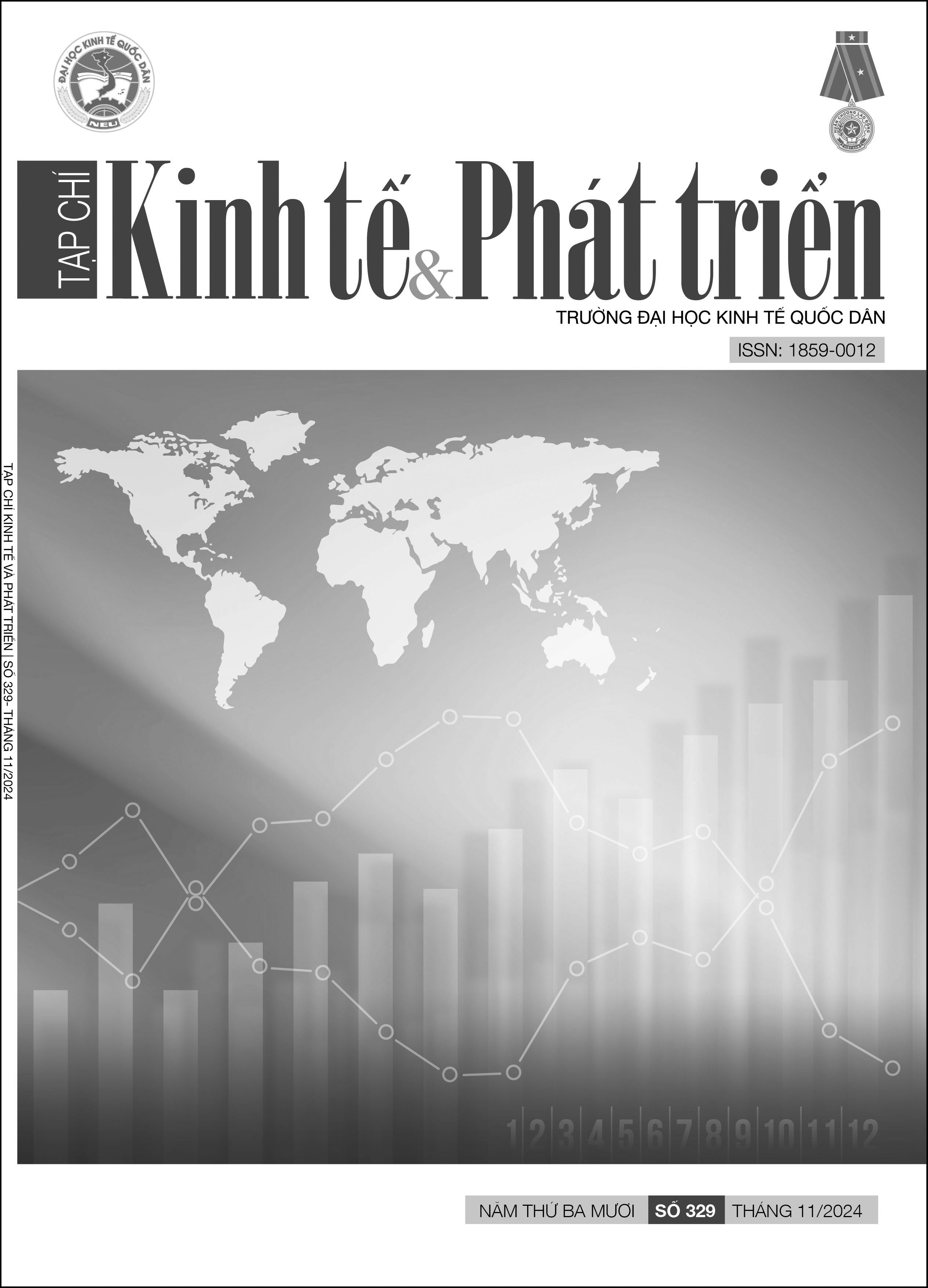Ảnh hưởng của công nghiệp hoá, tài nguyên thiên nhiên và năng lượng tái tạo đến tăng trưởng kinh tế ở các nước ASEAN
DOI:
https://doi.org/10.33301/JED.VI.1993Từ khóa:
Công nghiệp hóa, năng lượng tái tạo, tài nguyên thiên nhiên, tăng trưởng kinh tếTóm tắt
Nghiên cứu này đánh giá ảnh hưởng của công nghiệp hóa, tài nguyên thiên nhiên và năng lượng tái tạo đến tăng trưởng kinh tế ở các nước ASEAN trong giai đoạn 1995-2022. Nghiên cứu sử dụng kỹ thuật ước lượng ARDL với dữ liệu bảng bằng các phương pháp nhóm trung bình, nhóm trung bình gộp và hiệu ứng cố định động. Kết quả cho thấy công nghiệp hóa, tài nguyên thiên nhiên, tích lũy vốn, đầu tư trực tiếp nước ngoài, độ mở thương mại có tác động tích cực trong khi năng lượng tái tạo, lực lượng lao động có tác động tiêu cực đến tăng trưởng kinh tế ASEAN trong ngắn hạn. Trong dài hạn, tích lũy vốn, đầu tư trực tiếp nước ngoài, năng lượng tái tạo, lực lượng lao động có tác động tích cực còn công nghiệp hóa, độ mở thương mại tác động tiêu cực trong khi tài nguyên thiên nhiên không có tác động đến tăng trưởng kinh tế ở các nước ASEAN. Dựa trên kết quả này, một số hàm ý chính sách hướng đến phát triển kinh tế bền vững cho các nước ASEAN được đề xuất.
Tài liệu tham khảo
Acheampong, A.O., Dzator, J., & Savage, D.A. (2021), ‘Renewable Energy, CO2 Emissions and Economic Growth in Sub-saharan Africa: Does Institutional Quality Matter?’, Journal of Policy Modelling, 43 (5), 1070–1093, doi: http://doi.org/:10.1016/j.jpolmod.2021.03.011.
Ahmed, K., Mahalik, M.K., & Shahbaz, M. (2016), ‘Dynamics between economic growth, labor, capital and natural resource abundance in Iran: An application of the combined cointegration approach’, Resources Policy, 49(C), 213-221, DOI: http://doi.org/10.1016/j.resourpol.2016.06.005
Amri, F. (2017), ‘Intercourse across Economic Growth, Trade and Renewable Energy Consumption in Developing and Developed Countries’, Renewable and Sustainable Energy Reviews, 69(C), 527–534, DOI: http://doi.org/10.1016/j.rser.2016.11.230.
Aslan, A., & Altinoz, B. (2021), ‘The impact of natural resources and gross capital formation on economic growth in the context of globalization: evidence from developing countries on the continent of Europe, Asia, Africa and America’, Environmetal Science Polluttion Research, 28(26), 33794-33805, DOI: http://doi.org/10.1007/s11356-021-12979-7.
Attiah, E. (2019), ‘The role of manufacturing and service sectors in economic growth: an empirical study of developing countries’, European Research Studies Journal, 22(1), 112–127, DOI: http://doi.org/10.35808/ersj/1411.
Fleming, D.A., Measham, T.G., & Paredes, D. (2015), ‘Understanding the resource curse (or blessing) across national and regional scales: Theory, empirical challenges and an application’, Agriculture and Resource Economics, 59(4), 624-639, DOI: https://doi.org/10.1111/1467-8489.12118.
Hayat, A., & Tahir. M. (2020), ‘Natural resources and economic growth: evidence from the resource-rich region’, MPRA Paper No. 98772, University Library of Munich, Germany.
Kapoor, R. (2016), ‘Creating jobs in India’s organised manufacturing sector’, Indian Journal of Labour Economics, 58(3), DOI: http://doi.org/10.1007/s41027-016-0032-5.
Kripfganz, S., & Schneider, D. (2023), ‘ARDL: Estimating autoregressive distributed lag and equilibrium correction model’, The Stata Journal, 23(4), 983-1019.
Gerelmaa, L., & Kotani, K. (2016), ‘Further investigation of natural resources and economic growth: Do natural resources depress economic growth?’, Resources Policy, 50(C), 312-321, DOI: http://doi.org/ 10.1016/j.resourpol.2016.10.004.
Menegaki, A.N. (2011), ‘Growth and renewable energy in Europe: A random effect model with evidence for neutrality hypothesis’, Energy Economics, 33(2), 257-263, DOI: https://doi.org/10.1016/j.eneco.2010.10.004.
Ndiaya, C., & Lv, K. (2018), ‘Role of Industrialization on Economic Growth: The Experience of Senegal (1960-2017)’, American Journal of Industrial and Business Management, 8(10), 2072-2085, DOI: http://doi.org/ 10.4236/ajibm.2018.810137.
Opoku, E.E.O., & Yan, I.K.M. (2019), ‘Industrialization as Driver of Sustainable Economic Growth in Africa’, Journal of International Trade and Economic Development, 28(1), 30–56, DOI: http://doi.org/10.1080/09638199.2018.1483416.
Su, D., & Yao, Y. (2017), ‘Manufacturing as the key engine of economic growth for middle-income economies’, Journal of Asia Pacific Economics, 22(1), 47–70.
Saba, C.S. & Ngepah, N. (2021), ‘ICT Diffusion, Industrialisation and Economic Growth Nexus: An International Cross-Country Analysis’, Journal of the Knowledge Economy, 13(3), 2030-2069, DOI: http://doi.org/10.1007/s13132-021-00795-w.
Smolović, J.C., Muhadinović, M., Radonjić, M., & Durašković, J. (2020), ‘How Does Renewable Energy Consumption Affect Economic Growth in the Traditional and New Member States of the European Union?’, Energy Reports, 6(6), 505–513. http://doi.org/10.1016/j.egyr.2020.09.028
Szirmai, A., & Verspagen, B. (2015), ‘Manufacturing and Economic Growth in Developing Countries, 1950–2005’, Structural Change and Economic Dynamics, 34, 46–59. DOI: https://doi.org/10.1016/j.strueco.2015.06.002.
Wonyra, K.O. (2018), ‘Industrialization and Economic Growth in Sub-Saharan Africa: The Role of Human Capital in Structural Transformation’, Journal of Empirical Studies, 5(1), 45–54.
Sachs, J.D., & Warner, A.M. (1995), ‘Natural Resource Abundance and Economic Growth, NBER Working Papers Series No. w5398.
Sadorsky, P. (2009), ‘Renewable energy consumption and income in emerging economies’, Energy Policy, 37(10), 4021-4028, DOI: https://doi.org/10.1016/j.enpol.2009.05.003.
Sari, R., & Soytas, U. (2004), ‘Disaggregate energy consumption, employment, and income in Turkey’, Energy Economics, 26(3), 335–344, DOI: https://doi.org/10.1016/j.eneco.2004.04.014.
Tugcu, C.T., Ozlturk, I., & Aslain, A. (2012), ‘Renewable and non-renewable energy consumption and eocnomic growth revisited: Evidence from G7 countries’, Energy Economics, 34(6), 1942-1950, DOI: http://doi.org/10.1016/j.eneco.2012.08.021.
Uri, N.D. (1996), ‘An empirical re-examination of natural resource scarcity and economic growth’, Applied Stochastic Models and Data Analysis, 12(1), 45-61, DOI: http://doi.org/ 10.1002/(SICI)1099-0747(199603)12:13.0.CO;2-O.





